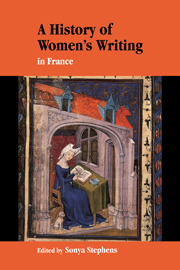Book contents
- Frontmatter
- Contents
- Notes on contributors
- Introduction
- 1 Female voices in convents, courts and households: the French Middle Ages
- 2 To choose ink and pen: French Renaissance women's writing
- 3 Altering the fabric of history: women's participation in the classical age
- 4 The eighteenth century: women writing, women learning
- 5 Eighteenth-century women novelists: genre and gender
- 6 The nineteenth century: shaping women
- 7 1900–1969: writing the void
- 8 From order to adventure: women's fiction since 1970
- 9 Changing the script: women writers and the rise of autobiography
- 10 Women poets of the twentieth century
- 11 Voicing the feminine: French women playwrights of the twentieth century
- 12 Feminist literary theory
- Bibliographies
- Index
4 - The eighteenth century: women writing, women learning
Published online by Cambridge University Press: 25 September 2009
- Frontmatter
- Contents
- Notes on contributors
- Introduction
- 1 Female voices in convents, courts and households: the French Middle Ages
- 2 To choose ink and pen: French Renaissance women's writing
- 3 Altering the fabric of history: women's participation in the classical age
- 4 The eighteenth century: women writing, women learning
- 5 Eighteenth-century women novelists: genre and gender
- 6 The nineteenth century: shaping women
- 7 1900–1969: writing the void
- 8 From order to adventure: women's fiction since 1970
- 9 Changing the script: women writers and the rise of autobiography
- 10 Women poets of the twentieth century
- 11 Voicing the feminine: French women playwrights of the twentieth century
- 12 Feminist literary theory
- Bibliographies
- Index
Summary
Men's writing has traditionally dominated the literary history of the French eighteenth century. Men have, entirely justifiably, been hailed for their achievements as precursors of the Enlightenment, as philosophes and Encylopédistes, as experimental novelists and successful dramatists. Literary women of the period have tended to achieve fame and notoriety more for their influential salons or political opinions than for their writing. Only recently have eighteenth-century women begun to emerge from the shadows as novelists, pedagogues and pamphleteers of note.
The particular problem which beset women's writing in eighteenth-century France was the importance accorded then to scientific, philosophical and political writing. How could inadequately educated women compete with Montesquieu (educated by the Oratorians and the law faculties of Bordeaux and Paris), Voltaire (by the Jesuits at Louis-le-Grand) or Buffon (who had followed legal, medical and botanical studies)? The problem was compounded by the dubious status of the female author, or femme-auteur. We know that intelligent and even erudite women failed to put their ideas into writing or, if they wrote, failed to have their work published. In his Traité des Sensations (Treatise on the Sensations) (1754) the famous philosopher, Condillac, paid homage to a Mlle Ferrand. He credited Ferrand not only with invaluable help in the preparation of his work but with having illuminated every aspect of the treatise.
- Type
- Chapter
- Information
- A History of Women's Writing in France , pp. 84 - 101Publisher: Cambridge University PressPrint publication year: 2000



